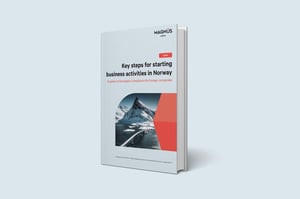
KEY STEPS FOR DOING BUSINESS IN NORWAY
A guide for foreign companies planning business activities in Norway
When foreign companies embark on short-term projects or establish long-term operations in Norway, understanding and adhering to key factors for success in the Norwegian market is essential. This is often referred to as Norwegian compliance.
To streamline the onboarding and project initiation process, we’ve compiled a list of 25 key factors to consider, along with practical instructions for doing business in Norway, and tips on relevant and useful resources to download.
Key highlights for doing business in Norway:
- Choosing your business structure
- Registering your company
- Gain access to Norwegian public services
- Registrar your business in the VAT register
- Report tax and employee matters to the Norwegian authorities
- Know and comply with Norwegian labor law and obligations, including global mobility matters
Key resources you should download

This comprehensive guide explains Norwegian Compliance in detail. Download to learn more.
This practical guide explains everything you need to know about Norwegian VAT regulations.
Adhering to Norwegian Labor Law is key when doing business in Norway. Download guide to get a full overview.
Norwegian compliance is complex and varies by country. Check out our country-specific Doing Business in Norway guide and download the version for your region
Why should you consider doing business in Norway?
- Norway has a stable economy, transparent governance, low corruption levels, and a predictable regulatory environment, making it a safe and reliable place for investments.
- Norway strongly focuses on sustainability with affordable, reliable, and green energy options for businesses aiming to reduce their carbon footprint.
- Norway's modern transportation networks, advanced digital infrastructure, and efficient ports facility seamless operations and connectivity both locally and internationally.
- The Norwegian labor market offers a highly skilled and multilingual workforce, ensuring access to talent across various industries.
- Norway actively supports research and development through grants, tax incentives, and funding programs, fostering technological innovation, green energy, and sustainable industries.
- Norway ranks among the top countries for quality of life, offering businesses a competitive edge in attracting and retaining talent.
Also read: Insights on Norwegian business culture

An introduction to Norwegian compliance
Norwegian compliance encompasses adhering to the rules, regulations, and standards established by Norwegian authorities and governing bodies. This involves adherence to a spectrum of legal aspects, spanning taxation, labor regulations, environmental standards, and general business operations.
Navigating these requirements can be complex, yet it's essential for companies seeking to do business in Norway.
Register your company in Norway - Obligations
Determining whether a foreign company's activities in Norway trigger registration and reporting obligations isn't always straightforward. The following responsibilities arise when a foreign company begins operations in Norway:
- Participates in “business activities” in Norway, invoicing more than NOK 20,000 for the work performed.
- Hires out employees to work in Norway.
- Has an employee working from a home office/office hotel in Norway, performing the “core activity” of the employer for more than 6 months.
Norwegian company registration options
The two main options for registering a company in Norway are:
- NUF: A Norwegian-registered foreign business, or
- Limited Liability Company: Similar to a subsidiary
Foreign companies engaged in project-based work without long-term plans in the Norwegian market often choose the NUF structure. This page will focus on exploring this option in detail. If you are interested in learning more about different company registration options, check out our blog covering the difference between an LLC and SP.
- 01 NUF EXPLAINED
- 02 LLC EXPLAINED
- 03 SP EXPLAINED
What is a Norwegian-registered foreign company?
The official translation of “NUF” is “Norwegian-registered foreign company”, but the term “Norwegian branch of a foreign company” is also used. Experience has shown that the term “branch” can confuse some foreign companies. It is important to understand that the NUF is not a separate legal entity. The NUF is merely a formal registration of the main company or “headquarters” in a foreign country. The formal registration says little about the foreign company's tax and VAT position.
Also read: How to establish a Norwegian branch of a foreign company (NUF)?
What is a limited liability company?
A limited liability company (LLC), in Norway known as "AS" or "aksjeselskap" is a legal business structure where the owners' liability is limited to their share capital. This means the shareholders are not personally responsible for the company's debts beyond their invested amount. Running a limited liability company (LLC) in Norway comes with several legal and administrative responsibilities that must be managed to stay compliant. While Norway does not require a company secretary by law, these duties are often carried out by a company secretary function.
Key features include:
- A minimum share capital of NOK 30,000.
- A board of directors is required, though small companies may not need a full board.
- The company must be registered with Brønnøysundregistrene (the Norwegian Register of Business Enterprises).
This structure is popular for businesses seeking limited personal financial risk and a formal legal framework.
Also read: Board responsibilities in a limited liability company
What is a sole proprietorship?
A sole proprietorship in Norway (called "enkeltpersonforetak") is a business owned and operated by a single individual. It is not a separate legal entity, meaning the owner is personally liable for all business debts and obligations. It's easy and inexpensive to set up, has low administrative requirements, and is commonly used by freelancers and small business owners. Profits are taxed as part of the owner's personal income.
LLC vs. NUF vs. SP
This table only shows a selection of the requirements for operating a company in Norway. To get a complete overview, and understand what applies to your specific business, a thorough review of your company is necessary.Gain access to Norwegian log-in-solutions for public services
After the NUF registration, the foreign company will obtain a Norwegian organization number, which means that the company will obtain access to;
- Altinn – the Norwegian log-in solution for public services, and
- The electronic portals of the Norwegian Tax Authorities.
These accesses are critical to be compliant with Norwegian reporting responsibilities.
VAT matters
A foreign company's sales in Norway exceeding NOK 50,000 over a 12-month period must register for VAT in Norway and add VAT to its turnover.
It is possible to apply for advance registration in the VAT register before any turnover accrues. For project-related work, this is often a recommendable solution for foreign companies. Importing goods to Norway triggers an obligation to pay import VAT on the border when clearing the goods through Customs. To avoid upfront payment of import VAT, it often makes sense to have VAT registration before customs clearance.
Also read: A practical overview of VAT in Norway
Reporting the assignment to the Norwegian tax authorities
A foreign company taking on a specific assignment in Norway must comply with the so-called Assignment and Employee Register (often called the “RF-1199 / RF-1198 reporting scheme”). In short, the client must file basic details about the assignment, such as relevant dates, whether the foreign contractor merely hires out employees or is a “genuine subcontractor”, and whether construction, installation or assembly works occur. These details are critical to find the correct tax and VAT positions of the foreign company. Furthermore, the foreign company is responsible for filing basic details about all employees working on the project.
Choose between genuine subcontract or hired labor contracts
The distinction between a “genuine subcontract” and a “hired labor contract” is unclear.
A typical hire-out-of-labor contract will imply that the foreign company does not have any risk and responsibility for the work performed by the employees. In short, the client is paying for the labor itself and not a certain result.
A genuine subcontract should imply that the foreign company is obliged to deliver a certain product and would not get paid if the job were not performed properly. In other words, the subcontractor has an economic risk and the responsibility for the result of the work performed by the employees. In short, the client is paying for a certain result. As mentioned, the distinction is critical to finding the correct tax positions (for foreign companies and their employees) and VAT positions.
Also read: Why contract classification is key to staying compliant in Norway
Norwegian work immigration matters
Planning ahead is critical when winning a project in Norway, especially when a foreign company will bring non-EU / EEA workers to Norway. The starting point is that any non-EU / EEA worker will need a work permit from UDI (the Norwegian Directorate of Immigration) to perform work here in Norway. The application process is comprehensive, and the processing time can be severe, at the time of writing, 3-4 months.
The so-called technical expert rule is a practical and important exception from the work permit application system. In short, a non-EU /EEA worker with a certain technical expertise can, without a work permit, enter Norway to work on a certain project where the need for the technical expertise does not exceed a duration of 3 months.
Also read: Work permits in Norway for skilled workers
ID check: Employees
When a foreign employee enters Norway, a physical visit to a Norwegian tax office is required. An appointment must be ordered in advance here.
The purpose of the ID check is for the workers to identify themselves to the Norwegian tax authorities and obtain a Norwegian tax deduction card.
The employees should bring identification papers (for instance, a passport), a confirmation letter describing the Norwegian assignment or the employment contract, and a filled-out tax deduction card application form containing certain personal data. The foreign company can also file this tax deduction card application form electronically in advance.
Also read: ID check for foreign employees in Norway
HSE cards for the Norwegian building and construction industry
Foreign workers often carry out tasks at Norwegian buildings or construction sites, where HSE cards are essential. These cards are typically required for physical access to the site and function as admission passes. To avoid delays and complications, it's crucial to follow the steps outlined above and initiate the process well before the cards are needed.
Also read: What is an HSE card?

A1 form
According to the Norwegian National Insurance Act, a foreign company doing business in Norway and its employees must contribute to Norwegian National Insurance Scheme. However, thanks to international agreements, it is relatively easy to avoid these payment obligations. Workers from EU countries should obtain an A1 Form documenting their membership in the National Insurance Scheme of their home country.
Advanced tax deductions
As mentioned, one of the purposes of the ID check is to obtain a Norwegian tax deduction card. According to the Norwegian Tax Payment Act, foreign companies must deduct and pay advance taxes to their employees working in Norway. Without the tax deduction card, the “default” is that the employer must deduct 50 percent advance tax. For companies without a permanent establishment in Norway, which we will touch on further below, it is possible to apply for an exemption from advance tax deductions.
Also read: 5 tax deductions to claim in your Norwegian tax return
A-report scheme
One of the most important reporting responsibilities in Norway is the so-called A-report scheme (called “A-melding” in Norway) – a salary reporting system. Once a month, the foreign employer must report salary information about each employee through the A-report scheme. Salary information includes all kinds of remuneration related to the work in Norway. This is a rather complicated set of rules. For instance, how the workers are living, whether their premises have cooking facilities, etc., are relevant questions.
Also read: What is an A-report - A guide for employers
In simple terms, the A-melding consists of three “boxes.”
- The “gross Norwegian salary.”
- The advance tax deductions.
- The employer’s social security contributions (which should be NOK 0 if the relevant employee has an A1 form, cf. above).
Tax obligations for foreign companies in Norway
The corporate tax rate in Norway is currently 22 percent. According to the Norwegian Tax Act, Section 2-3 (1) letter b, a foreign company is taxable to Norway on profits from “business activities… which take place in” Norway. Presumably, the business profits from the Norwegian activity will also be taxable in the foreign company’s country of residence. To avoid double taxation, Norway has entered tax treaties with roughly 90 countries.
To determine which country has “the upper hand” in imposing a tax on the business profits, each tax treaty must be studied closely. As a main rule, Norway will only be able to impose a tax on business profits attributable to a permanent establishment in Norway.
In short, the business activity of a foreign company can constitute a permanent establishment in Norway in three different ways:
-
The foreign company has a “fixed place of business” in Norway. The classic example would be operating through office premises or a factory. The starting point is that the fixed place of business must be maintained for a certain amount of time, at least for roughly six months.
-
The foreign company participates in a construction, installation, or assembly project lasting more than twelve months (six months in some important tax treaties, such as Norway vs. Portugal and Norway vs. the Czech Republic).
-
The foreign company has an “agent” in Norway, for instance, a person who operates in Norway and enters into agreements with Norwegian customers on behalf of the foreign company.
About Norwegian corporate tax return
The starting point is that all foreign companies with business activities in Norway must file a Norwegian corporate tax return. The deadline for submitting the company tax return is 31 May of the following year (e.g. The deadline for the 2024 company tax return is 31 May 2025).
For foreign companies with a permanent establishment in Norway, cf. above, the starting point is that Norway has taxation rights (tax rate 22 percent per 2024) to business profits “attributable” to the permanent establishment. A natural starting point is to “simulate” that the Norwegian permanent establishment is a separate legal entity. However, the allocation of income/costs is never black or white, and there are many complex questions to consider.
Please note that from 1 January 2022, it is possible to apply for an exemption from the tax return filing obligation. The exemption will only be given to foreign companies that can substantiate that their Norwegian activities will not constitute a permanent establishment in Norway.
Also read: Business in Norway - Tax audit
Tax obligation for employees working in Norway
Whether the employees will be taxable to Norway, cf. the Tax Treaty is more complicated, but we can start with the obvious. If the employees are hire-out employees, the Norwegian tax authorities will probably claim that the workers are taxable to Norway.
Suppose the foreign company's construction work does not constitute a permanent establishment in Norway. In that case, the workers will—in most tax treaties—avoid Norwegian taxability unless they have stayed in Norway for more than 183 days within a 12-month period. However, each specific tax treaty must be studied closely, as there are many pitfalls.
About Norwegian tax return for employees
In practice, foreign employees can define Norwegian taxability. If the relevant tax treaty suggests that Norway does not have the taxation right, for instance, when the employer does not have a permanent establishment in Norway, and the worker’s Norwegian presence has not exceeded 183 days within a 12-month period (or 270 days within a 36-month period), the employee can “cross out” the Norwegian income and attach a brief explanation.
PAYE (Pay As You Earn) - for foreign workers
In short, income from employment is taxed at a flat rate of 25 percent. This rate includes employees’ social security contributions, which are 7.8 percent. Filing a valid A1 form with the Norwegian authorities, exempting the employees from the Norwegian social security scheme, reduces the flat tax rate to 17.2 percent (25 minus 7.8).
The PAYE scheme is meant for foreign employees who work in Norway for short periods of time and who are not tax residents (less than 183 days in Norway within a 12-month period). The scheme also applies to most foreign workers in the year in which they become tax residents.
It is impossible to join the PAYE scheme if the annual income exceeds NOK 670 000 for the income year 2024).
Norwegian tax assessment
However, suppose the foreign company or the foreign employee is taxable in Norway. In that case, the Norwegian tax assessment will document the Norwegian tax burden, which can be used to, for instance, obtain a tax credit in the company’s / employee’s country of residence.
Accounting and auditing
In general, all foreign companies doing business in Norway must keep books of accounts based on the Norwegian general accepted accounting principles (“NGAAP”). The Register of Company Accounts will demand annual accounts for all foreign companies that are registered in the Register of Business.
Enterprises (“Foretaksregisteret”). Foreign companies that are only registered in the Central Coordinating Register for Legal Entities (“Enhetsregisteret”) will, as a starting point, not be asked for annual accounts.
Suppose the relevant tax treaty gives Norway the taxation right to the business profits of the foreign company, primarily when the company has a permanent establishment in Norway. In that case, the company must have a Norwegian auditor if the Norwegian turnover exceeds NOK 7 000 000, if the balance sheet shows assets of more than NOK 27 000 000, or average number of employees exceeds 10 full-time equivalents.
Also read: Why correct accounting is essential for your business success in Norway
Labor law matters
It is fair to say that the Norwegian Working Environment Act gives employees stronger rights than laws in many comparable countries. As an example, workers have strong protection against unjust termination.
In our experience, working hours and salary levels are often the focus of the controlling party.
Also read: A Norwegian Labor Law guide for employers

HSE matters
From an HSE perspective, it is rather clear that the Board of Directors and the General Manager in the main company can potentially be held responsible for accidents, failures, and incidents at construction sites in Norway. In short, “the employer” is responsible for HSE measures, cf. Section 3-1 in the Working Environment Act. The term “employer” refers to “the person who manages the business in the employer’s place”. In most cases, this will be the company’s chief administrative officer, which is the “general manager” from a Norwegian point of view.
In practice, this means that the General Manager of the main company should ensure that HSE measures / HSE plans / HSE routines are bullet-proof for workers traveling to Norway to perform work.
Also read: When is a safety representative required in a company?
Electro professional matters
Companies that perform work related to electrical installations and repair of electrical equipment are obligated to register at the so-called “Elvirksomhetsregisteret,” the Norwegian register of enterprises that design, install, and maintain electrical installations and electrical equipment. The registration itself is rather simple. However, the main issue is that the subject to registration must list a professionally responsible person (or “Faglig ansvarlig” in Norwegian). The application process is rather exhausting and rather time-consuming. Planning ahead is critical to avoid delays.
Also read: Registration and approval guide for foreign electrical workers
Quality certifications
Over the last couple of years, we have experienced that Norwegian companies, especially big public companies, have started demanding that foreign companies obtain certain quality certifications before winning contracts in Norway. The so-called “Central Approval” / “Sentral Godkjenning” or StartBANK certification are examples. It is fair to say that these quality certifications can have a commercial effect and increase visibility in the Norwegian market, adding a certain stamp of quality to the business.
Also read: StartBANK registration and its benefits
The Transparency Act
The Norwegian Transparency Act entered into force on 1 July 2022. The Act promotes enterprises’ respect for fundamental human rights and decent working conditions. It will primarily be relevant for larger enterprises.
In short, the Transparency Act requires larger enterprises to:
- Carry out a due diligence assessment, meaning that they must look at both their own business, their supply chain, and their business partners to find out where the biggest risks are.
- Publish an account of the due diligence assessment – in practice, a due diligence report – on the company’s webpage.
- Provide information upon request from the Norwegian Consumer Authority. This administrative body is responsible for monitoring compliance with the provisions of the Transparency Act. Please note that the potential sanctions can be quite severe.
Section 3 of the Transparency Act points out that the company “on the date of financial statements [must] exceed the threshold for two of the following three conditions:
- sales revenues: NOK 70 million
- balance sheet total: NOK 35 million
- average number of employees in the financial year: 50 full-time equivalents.”

Your full service legal provider when doing business in Norway
With extensive legal expertise and deep knowledge of Norwegian law, we offer tailored business law services to guide you through every stage of your business journey. Our collaborative, cross-disciplinary teams ensure seamless support, all coordinated through a dedicated legal project manager as your single point of contact.

Get expert legal help when doing business in Norway?
The list above highlights some of the key factors to consider when entering the Norwegian business market. Navigating Norwegian compliance can be complex, with its intricate laws, regulations, reporting requirements, and application processes.
To ensure a smooth start, we strongly recommend seeking professional advice early in your project. Doing so can help you avoid potential pitfalls, saving both time and money in the long run.
At Magnus Legal, you’ll find a versatile team of business lawyers with deep expertise in Norwegian compliance. As a full-service business law firm, we help your company thrive in Norway—supporting everything from establishment to winding down operations. With years of experience, we've successfully guided international businesses through the complexities of the Norwegian market.







